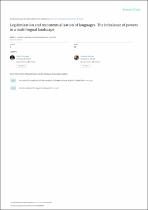| dc.contributor.author | Simungala, Gabriel | |
| dc.contributor.author | Jimaima, Hambaba | |
| dc.date.accessioned | 2023-03-28T06:47:04Z | |
| dc.date.available | 2023-03-28T06:47:04Z | |
| dc.date.issued | 2023 | |
| dc.identifier.citation | Simungala, G., & Jimaima, H. (2023). Legitimization and recontextualization of languages: The imbalance of powers in a multilingual landscape. Linguistic Landscape, 9(1), 36-58. | en_US |
| dc.identifier.issn | 2214-9953 | |
| dc.identifier.uri | https://doi.org/10.1075/ll.21045.sim | |
| dc.identifier.uri | http://hdl.handle.net/10566/8663 | |
| dc.description.abstract | We use the uneven distribution of languages in the public spaces of the University of Zambia and the voices and narratives that emerge to argue for legitimization and recontextualization as critical components in the presence and contestations of languages. Using data from interviews and photographs of signage in place, we show legitimization of foreign languages in which English, Japanese, and Chinese forge a place of linguistic contestation and legitimization through control and superiority. We argue for the apparent hegemony of foreign languages and the striking paucity of monolingual signage of indigenous languages as the imbalance of powers. While the former shows the influence of the global in the local, the prospects for the latter continue to diminish as their chances and opportunities as linguistic capital for wider/global communication do not look so favourable. We conclude with the glaring reality of recontextualization as capital for the display of indigenous inclined discourses | en_US |
| dc.publisher | John Benjamins Publishing company | en_US |
| dc.subject | imbalance | en_US |
| dc.subject | legitimization | en_US |
| dc.subject | multilingual landscape | en_US |
| dc.subject | recontextualization | en_US |
| dc.subject | Zambia | en_US |
| dc.title | Legitimization and recontextualization of languages: The imbalance of powers in a multilingual landscape | en_US |
| dc.type | Article | en_US |

